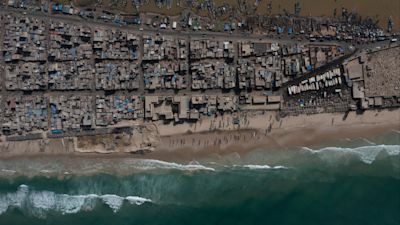COP26: Vulnerable countries to receive almost £300m from UK government to fight climate change

The UK government has unveiled plans to invest almost £300 million helping the most vulnerable countries battle the devastating effects of climate change.
Ministers from at least 26 countries and regions will on Monday attend a session at the COP26 summit, where International Trade Secretary Anne-Marie Trevelyan is set to announce a financial pledge from Westminster.
Representatives from the US and the European Commission, will be among those in attendance.
Ms Trevelyan, the UK government’s champion for adaptation and resilience at COP26, will use the platform of the climate change conference in Glasgow to call on countries to do more to support developing countries.
Some £274 million will be invested in Asia and the Pacific region to help communities better prepare for the impact of climate change, while a £15 million adaptation fund for developing countries will be created.
The announcements, which come on the summit's adaptation, loss and damage day, will also include a £1 million pledge to support the humanitarian response to climate change- meaning the total amount pledge stands at £290 million.
“We must act now to stop climate change from pushing more people into poverty," Ms Trevelyan said ahead of the event.
“We know that climate impacts disproportionately affect those already most vulnerable.
“We are aiming for significant change that will ultimately contribute to sustainable development and a climate-resilient future for all, with no-one left behind.”
The COP27 climate conference - what you need to know
What is COP27? When and where will it be?
What is COP27? When and where will it be?
Each year, the United Nations Framework Convention on Climate Change (UNFCCC) meets at what is called the Conference of the Parties (abbreviated as COP) to discuss the world's progress on climate change and how to tackle it.
COP27 is the 27th United Nations Climate Change Conference of the Parties summit which will be held in Sharm El Sheikh, Egypt from November 6-18.
Who is going?
Who is going?
Leaders of the 197 countries that signed the United Nations Framework Convention on Climate Change (UNFCCC) - a treaty that came into force in 1994 - are invited to the summit.
These are some of the world leaders that will be attending COP27:
UK Prime Minister Rishi Sunak is attending the conference, after initially saying he wouldn't as he was too busy focusing on the economy within his first weeks in office.
US President Joe Biden and his experienced climate envoy, John Kerry, will appear at the talks.
France President Emmanuel Macron will also be among the heads of state from around the world staying in Egypt.
King Charles III will not be attending COP27, despite being a staunch advocate for the environment. The decision was made jointly by Buckingham Palace and former prime minister Liz Truss.
Elsewhere, Russian President Vladimir Putin and his Chinese counterpart Xi Jinping will not attend the talks just as they decided to do for COP26.
What is it hoping to achieve?
What is it hoping to achieve?
1. Ensure full implementation of the Paris Agreement and putting negotiations into concrete actions - included within this is the target of limiting global warming to well below 2C.
2. Cementing progress on the critical workstreams of mitigation, adaptation, finance and loss and damage, while stepping up finance notably to tackle the impacts of climate change.
3. Enhancing the delivery of the principles of transparency and accountability throughout the UN Climate Change process.
Representatives of communities hit by climate change will also be given a chance to speak to world leaders at the meeting.
Emily Bohobo N’Dombaxe Dola, the facilitator of the adaptation resilience group at Youth NGOs (Youngo) – a group set up by the UN Framework Convention on Climate Change– will address the ministers.
“I was drawn to climate action after seeing first-hand the impacts of climate change on local coastal communities in Senegal, both impacts already there and those yet to come,” she said.
“It is the socially marginalised and geographically vulnerable across both northern and southern societies that already suffer the most due to natural disasters and shifting weather patterns, from working-class and refugee communities, through to people with disabilities, the elderly, women and young girls.
“Yet I have encountered countless displays of resilience by these communities and local actors.
“Now it is time for governments and donors to level up on equitable finance and plans for loss and damage and for adaptation.”